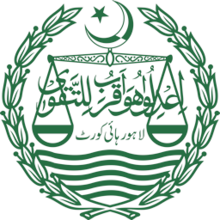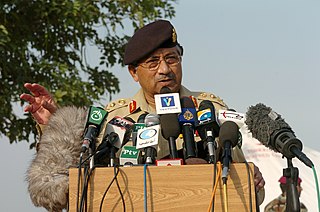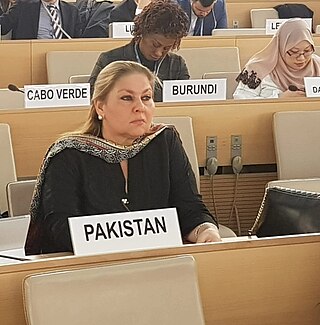Related Research Articles

Mian Muhammad Nawaz Sharif is a Pakistani businessman and politician who served as the Prime Minister of Pakistan for three non-consecutive terms. He is the longest-serving prime minister of Pakistan, having served a total of more than 9 years across three tenures. Each term has ended in his ousting.

The President of Pakistan is the head of state of the Islamic Republic of Pakistan. The president is the nominal head of the executive and the supreme commander of the Pakistan Armed Forces. The Presidency is a ceremonial position in Pakistan. The President is bound to act on advice of Prime Minister and cabinet. Asif Ali Zardari is the current President since 10 March 2024.

Makhdoom Muhammad Javed Hashmi, is a Pakistani politician, political realist, and a senior conservative thinker on the platform of Pakistan Muslim League (N).

The Supreme Court of Pakistan is the apex court in the judicial hierarchy of the Islamic Republic of Pakistan.

The Lahore High Court is a provincial court house based in Lahore, Punjab, Pakistan. It was established as a high court on 21 March 1882. The Lahore High Court has jurisdiction over the province of Punjab. The High Court's principal seat is in Lahore, but there are benches in three other cities of the province: Rawalpindi, Multan and Bahawalpur.

Rawalpindi Division, also locally known as Pothohar or North Punjab region, is an administrative division of Punjab Province, Pakistan. Rawalpindi city is the capital of the division. According to the 2017 Census of Pakistan, the total population of division was 10 million. Divisions are the third tier of government below the federal and provincial levels.

The 1999 military takeover in Pakistan was a bloodless coup d'état initiated by the military staff at the Joint Staff HQ working under the Chairman of the Joint Chiefs of Staff Committee and Chief of Army Staff General Pervez Musharraf. The instigators seized control of the civilian government of the popularly elected Prime Minister Nawaz Sharif on 12 October 1999. On 14 October, General Musharraf, acting as the country's Chief Executive, issued a controversial provisional order that suspended the Constitution of Pakistan.

Athar Minallah is a Pakistani lawyer, and jurist who is serving as a judge of Supreme Court of Pakistan since 11 November 2022. Before his appointment to the Supreme Court of Pakistan, he was a judge of the Islamabad High Court for 8 years, and also served as its 5th Chief Justice from 28 November 2018 to 10 November 2022.

Muhammad Bilal Khan was a Justice in the Lahore High Court in Pakistan.

Mohammad Nawaz Abbasi is former justice of the Supreme Court of Pakistan and a former justice of Lahore High Court.
The Kyber Pakhtunkhwa Judicial Academy is an institution of higher learning in Peshawar, Pakistan which focuses on legal and judicial studies. Its mission is "to change the attitude of young law graduates as judges and to inculcate in them patience, sobriety, confidence, discipline and skill of high quality legal reasoning; to develop their capacity; to enable them to create harmony among all justice sector institutions; to sensitize them to the rights of all litigant public, notably, of the vulnerable communities; and to make them leaders to contribute to the rule of law.

Rabiya Javeri Agha is the Chairperson of the National Commission for Human Rights (NCHR) in Pakistan, and a retired civil servant officer who served in the Government of Pakistan in BPS-22 grade as Federal Secretary. She was the first unanimously elected female President of the Pakistan Administrative Service (PAS) Officers Association, and she has had an extensive career ranging from human rights, women's development, sustainable tourism, energy, finance and trade.

Mian Saqib Nisar is a Pakistani jurist who served as the 25th Chief Justice of Pakistan from 31 December 2016 till 17 January 2019. He has previously served as the Law Secretary. He also served as a visiting professor of law at the University of the Punjab, where he provided instructions on constitutional law.

The Panama Papers case, or the Panamagate case, was a 2017 landmark decision by the Supreme Court of Pakistan that disqualified Nawaz Sharif, the prime minister of Pakistan, from holding public office for life.
Emmanuel Oluwasegun Fagbenle is a Nigerian judge who served as Yahya Jammeh's last Chief Justice of the Gambia from 2015 to 2017, until the 2016 presidential election.

Sikandar Sultan Raja is a retired Pakistani civil servant who has been the Chief Election Commissioner of Pakistan since January 2020. Raja belongs to the Pakistan Administrative Service and is batchmates with Rizwan Ahmed, Hussain Asghar, Fawad Hasan Fawad and Jawad Rafique Malik.
Umar Ata Bandial is a Pakistani jurist who served as the 28th Chief Justice of Pakistan from February 2022 to September 2023. He was appointed as the Chief Justice after the approval by President Arif Alvi on 13 January 2022, after which he assumed his office on 2 February 2022 and retired on 16 September 2023.
Aamer Farooq is a Pakistani jurist who is currently serving as a Chief Justice of Islamabad High Court since 11 November 2022 and also been Justice of the Islamabad High Court from 31 December 2014 to 10 November 2022.

Tanveer Jahan is a Pakistani human rights defender and trainer. Jahan has been associated with the social development sector in Pakistan for over 35 years. She serves as Executive Director at the Democratic Commission for Human Development, and as National Coordinator of the Pakistan Human Rights Defenders Network. She has served as a member at the National Commission on the Status of Women (NCSW).
National Women's Day in Pakistan is 12 February of each year, chosen to mark the first women's march in Pakistan against the Zia ul Haq's military regime. The date 12 February 1983 is significant in the history of women's rights in Pakistan because the first such march was brutally suppressed by the martial law enforced by the police of General Zia ul Haq's regime. The Day is over three weeks before International Women's Day when the Aurat Marches take place in Pakistan.
References
- ↑ "Examinations of Sections 54 and 167 of the Code of Criminal Procedure 1898" (PDF). Examinations of Sections 54 and 167 of the Code of Criminal Procedure 1898. Report 49: 153.
- ↑ "UNESCO Programs Pakistan National Commission for UNESCO". www.pncugovpk.com. Retrieved 2019-10-02.
- 1 2 "Gambia's Chief Justice dismissed". thepoint.gm. 13 May 2015. Retrieved 2019-10-02.
- ↑ Khan, Azam (16 February 2016). "Conspiracies being hatched against NCHR: Chowhan". The Express Tribune.
- ↑ "The Gambia to drop English as the national language". country.eiu.com. Retrieved 2019-10-02.
- ↑ Asemota, Sidiq (9 December 2014). "Gambian Judiciary Reforming to Tackle Bureaucratic Shackles - Chief Justice Chowhan Tells Colleagues in Algiers". The Daily Observer.
- ↑ Asad, Malik (2015-05-26). "Profile: From Pindi to Gambia and back". DAWN.COM. Retrieved 2019-10-02.
- ↑ "Gambian president sacked Supreme Court judges". News24. 2015-06-29. Retrieved 2019-10-02.
- ↑ "Pakistan: Commission probes allegations of police torture in Faisalabad | Asia Pacific Forum". www.asiapacificforum.net. Retrieved 2019-10-02.
- ↑ "Chowhan urges stakeholders to support NCHR efforts". The Frontier Post. 2017-12-19. Retrieved 2019-10-02.
- ↑ "Annual Report" (PDF). National Commission for Human Rights, Pakistan. 2017.
- ↑ "National Commission for Human Rights nominates focal persons for collecting data and reporting crimes against journalists". unesco.org.pk. Retrieved 2019-10-02.
- ↑ "Justice Ali Nawaz Chohan Appointed chairman of NCHR -". 2015-05-26. Retrieved 2019-10-02.
- ↑ "Ali Nawaz Khan". School of Law. 2017-09-06. Retrieved 2019-10-02.
- ↑ "PRSP". www.prsp.org.pk. Retrieved 2019-10-02.
- ↑ "Justice Ali Nawaz Chohan is no more". 4 September 2023.